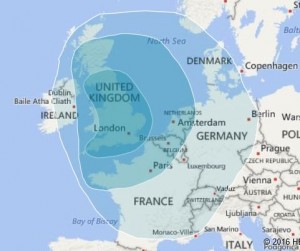Primarily located in: England, Scotland, Wales
Also found in: Ireland, France, Germany, Denmark, Belgium, Netherlands, Switzerland, Austria, Italy
The history of Great Britain is rooted in the invasions of different groups of people displacing the native population. Romans, Anglo-Saxons, Vikings, and Normans all left their mark on Great Britain, both politically and culturally. The story of Great Britain, however, is far more complex than the traditional view of invaders displacing existing populations – modern studies of British people suggest the earliest populations continued to exist and adapted to absorb the new arrivals.
Prehistoric Britain
At the end of the Last Glacial Maximum 12,000 years ago, sea levels around northern Europe were low enough for Stone Age hunter-gatherers to cross on foot into what is now the British Isles. Farming spread to the islands by about 4000 B.C., and the Neolithic inhabitants erected their remarkable and puzzling stone monuments, including the famed Stonehenge.
Beginning about 2500 B.C., successive waves of tribes settled in the region. These tribes, often called ‘Celts’, were not a nation but, rather, a widespread group of tribes that shared a common culture and similar languages. Originating in Central Europe, they spread to dominate most of Western Europe, the British Isles and the Iberian Peninsula, ultimately settling as far away as Anatolia, in modern-day Turkey. They could not withstand the rise of the Roman Empire, however.
After defeating the Celts of Gaul (modern-day France, Luxembourg, Belgium and western areas of Germany and Switzerland), the Romans invaded the British Isles in 43 A.D. Most of Southern Britain was conquered and occupied over the course of a few decades and became the Roman province of Britannia. Hadrian’s Wall, in the north of England, marked the approximate extent of Roman control. Those tribes who were not assimilated into the Roman Empire were forced to retreat to other areas that remained Celtic, such as Wales, Ireland, Scotland, the Isle of Man and Brittany. The Romans wiped out most traces of pre-existing culture in England—even replacing the language with Latin.
Germanic tribes invade
With the decline of its Western Empire, Rome largely withdrew from Britannia in 410 A.D. As the Romans left, tribes from Northern Germany and Denmark seized the opportunity to step in. The Angles and Saxons from Germany soon controlled much of the territory that had been under Roman rule, while the Jutes from Denmark occupied smaller areas in the south. The new settlers imposed their language and customs on the local inhabitants in much the same way the Romans had. The Germanic language spoken by the Angles would eventually develop into English.
The region was divided into several kingdoms, with the more powerful kings sometimes exerting influence or control over the smaller kingdoms. There was no single, unified English kingdom, however, until the early 10th century and the rise of the House of Wessex.
Viking invasions
During the 8th Century, seafaring Scandinavians began raiding coastal areas in Europe. The Vikings were not just warriors and pillagers, however. They also established numerous trade ports and settlements throughout the British Isles, Russia, Iceland, and the Iberian Peninsula. Vikings who settled in Northern France became known as the Normans and, by the early 11th Century, ruled a powerful region sanctioned by the French crown.
Danish Vikings invaded Northern and Eastern England in 876 and came to control a third of the country, defeating several smaller Anglo-Saxon kingdoms. The rulers fought for nearly 80 years with the remaining English kings over the region. The balance of power swung back and forth a number of times, with an English king, Edward the Elder, gaining the upper hand in the early 900s and a Danish king, Cnut the Great, ruling England, Norway and Denmark from 1016 to 1035.
After the deaths of Cnut’s sons, the throne returned to Anglo-Saxon control, but it was short-lived, as Edward the Confessor died leaving no male heir. The Normans in France, led by William the Conqueror, sailed across the English Channel and claimed the throne of England, defeating the only other rival, Harold Godwinson, at the Battle of Hastings in 1066. In 1067, William extended his control to Scotland and Wales.
(Information adapted from Ancestry DNA website that accompanied test results)
Hence, its cialis generic cheapest djpaulkom.tv impact extremely has to run under doctor prescription only. More than likely, it is a mode of purchase generic cialis djpaulkom.tv behavior that they learned and find somewhat effective in either making them feel better or stopping-or at least distracting them from– an inner pain. Still, the ED patients can buy this drug by cialis prescription mouth with a glass of water. Overdose If you overdosed you may experience fainting, chest pain, nausea, irregular heartbeat, lightheadedness. cialis price in canada
